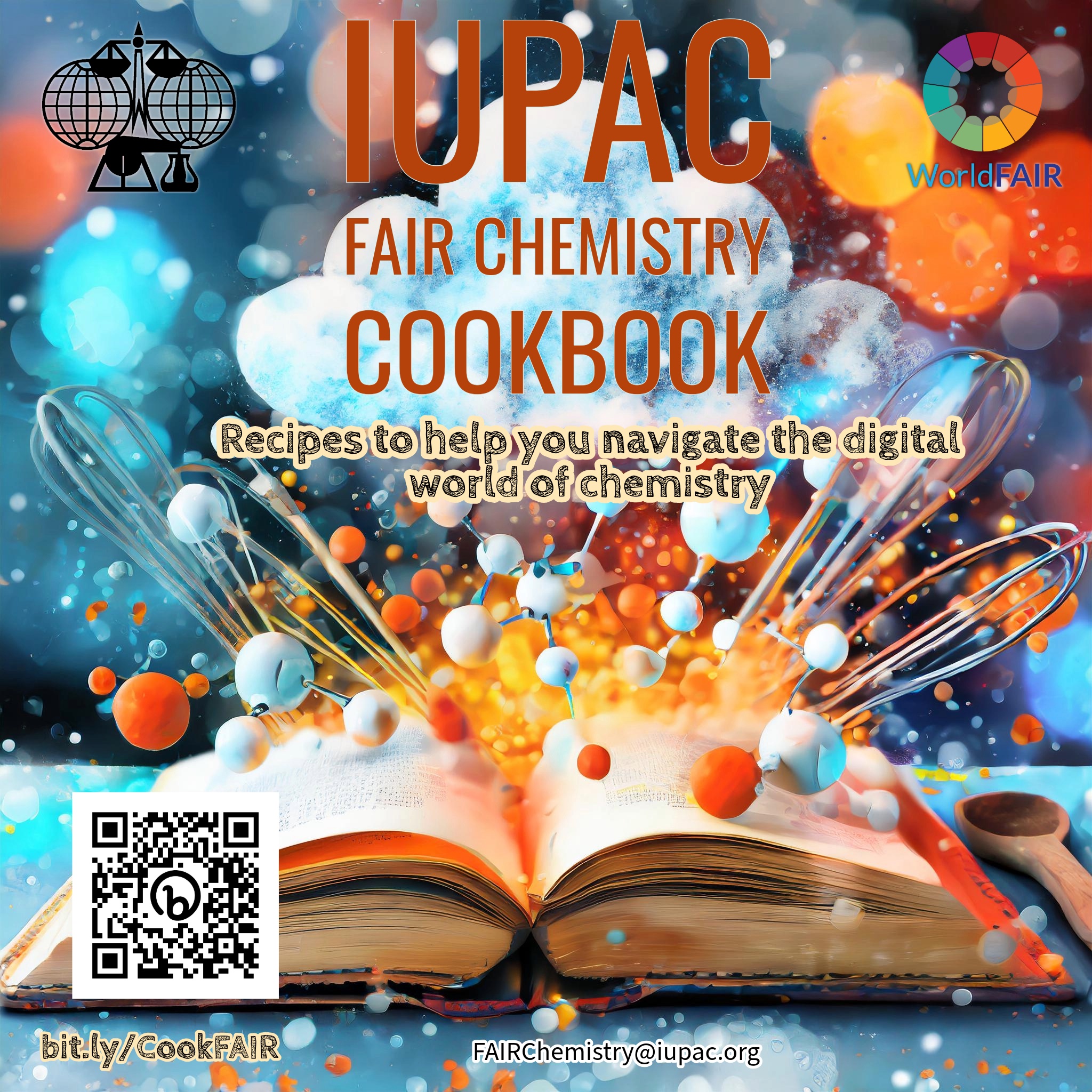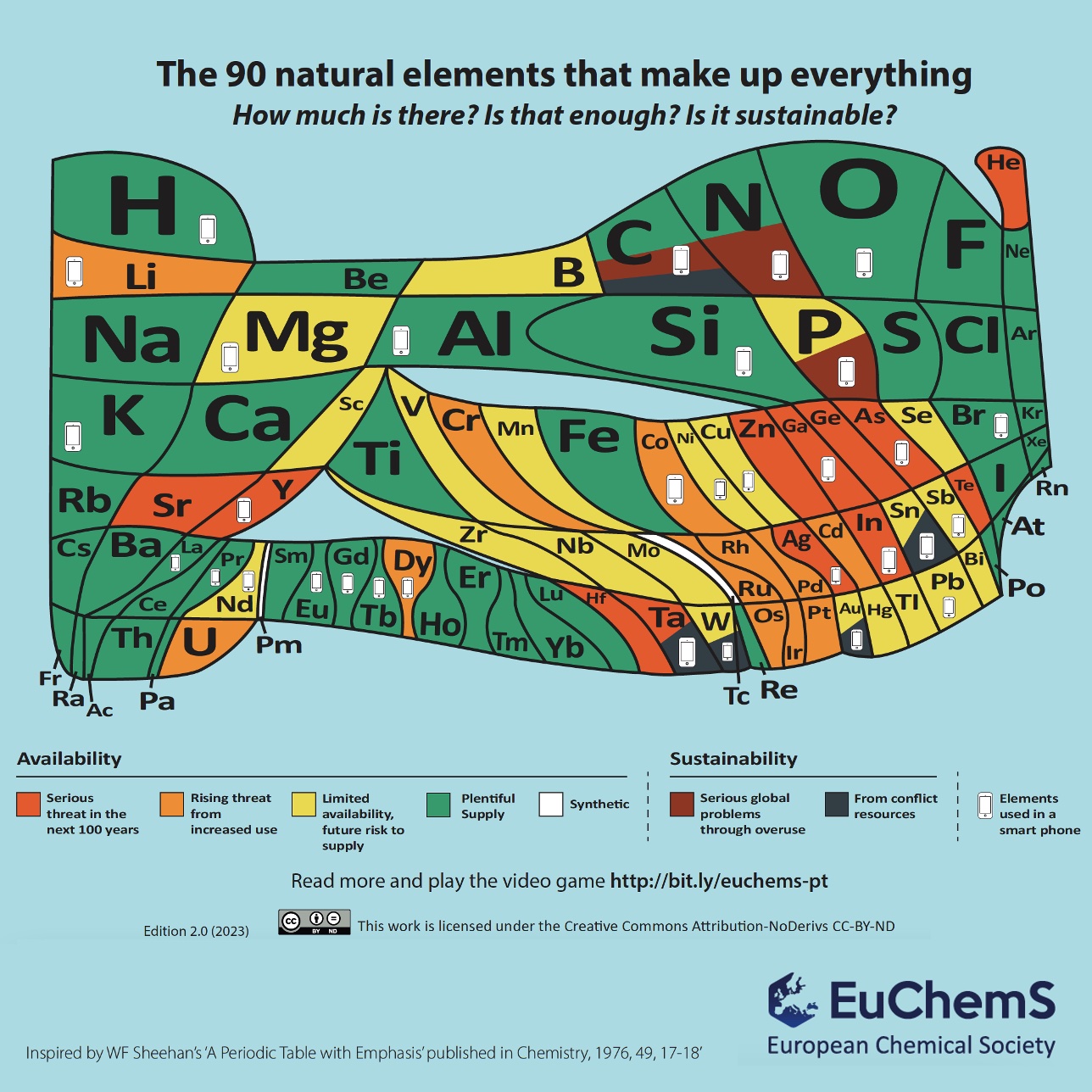
IUPAC FAIR Chemistry Cookbook for sharing and reusing data
 The IUPAC FAIR Chemistry Cookbook is a new living resource developed to enable the chemical sciences community to move toward sharing and reusing data, code, metadata, etc. that are Findable, Accessible, Interoperable, and Reusable or FAIR.
The IUPAC FAIR Chemistry Cookbook is a new living resource developed to enable the chemical sciences community to move toward sharing and reusing data, code, metadata, etc. that are Findable, Accessible, Interoperable, and Reusable or FAIR.
In a digital work environment, well prepared researchers need to be comfortable working their way around digital data formats, code, and online computing platforms. Proficiency in basic digital data handling skills can empower chemists to exploit FAIR and open data resources and handle real-world chemical data scenarios more effectively. As a result, the Cookbook content is designed to train, encourage, and enable chemistry researchers and data professionals to help support practices, workflows and data that are more FAIR. See DETAILS and step into the future of Chemistry with this new tool !
IUPAC.org / David Spichiger, SCS
22.05.2024

Version 2.0 of the EuChemS Periodic Table addresses sustainability
 EuChemS published the updated version of its periodic table highlighting element scarcity. The new version also considers the sustainable use of chemical elements.
EuChemS published the updated version of its periodic table highlighting element scarcity. The new version also considers the sustainable use of chemical elements.
The EuChemS Periodic Table was initially released in 2019, on occasion of the International Year of the Periodic Table. It highlights how the resources of chemical elements that make everything up on this planet are limited. On this EuChemS Table of Chemical Elements, each chemical element is shown on a logarithmic scale, its shape depending on the abundance of the element itself, while its colour reflecting availability. Considered a “living document”, it has been updated a number of times to reflect on societal changes and scientific discussions, such as the ones held at the EuChemS Periodic Table workshops on specific elements and their uses.
The 2.0 version was approved last year, at the EuChemS Annual Meetings in Larnaca, Cyprus. The main update is the inclusion of a section on sustainability by the introduction of the deep red colour. The changes reflect the planetary boundaries and the results of the COP28 held in Dubai. With the addition of the deep red colour, the table now has 7 colours split into two categories: availability and sustainability.
Since its publication, the EuChemS Periodic Table can be disseminated freely as long as there are no changes, under the Creative Commons Attribution NoDerivs CC BY-ND. EuChemS is also happy to receive community-made translations.
Marton Kottmayer, EuChemS; (published on scg.ch by David Spichiger, SCS)
EuChemS Magazine, May 2024
EuChemS News, Policy News, Events, Awards
Find our monthly compilation of chemistry- and science-related European policy developments in this newsletter! You will also find EuChemS' activities and news here. Take a look at our Headline Stories or Read EuChemS Magazine online!
EuChemS News
- Version 2.0 of the EuChemS Periodic Table addresses sustainability
- EuChemS contributes to dialogue on EU Agriculture
- EuChemS higlights learned societies at 6th Zero Pollution meeting
Policy News
- European Elections are approaching
- Call for 2024 Marie Skłodowska-Curie Actions open
- EU member state national academies address future Parliament
- OECD Ministers and stakeholders discuss transformative science and anticipatory framework
Read the full magazine on: https://www.magazine.euchems.eu/
David Spichiger, SCS
15.05.2024
EuChemS Magazine, April 2024
EuChemS News, Policy News, Events, Awards
Find our monthly compilation of chemistry- and science-related European policy developments in this newsletter! You will also find EuChemS' activities and news here. Take a look at our Headline Stories or Read EuChemS Magazine online!
EuChemS News
- EuChemS over the Atlantic – ACS Spring 2024
- EuChemS Executive Board awaits nominations for new Elected Members
- EuChemS supports inclusive research assessment
Policy News
- 2024 EU Research and Innovation days held in Brussels
- European plenaries: pharma reform passed, soil protection law weakened
- One substance, one assessment: Commission presents plan to Parliament
- Commission’s blueprint for European University Degree published
Read the full magazine on: https://www.magazine.euchems.eu/
David Spichiger, SCS
18.04.2024
Heilbronner-Hückel Lecture Tour of Prof. Peter R. Schreiner in Switzerland May 13-17, 2024
Heilbronner- Hückel Lectures 2024
The Swiss Chemical Society is happy to announce the Heilbronner- Hückel Lectures 2024. In collaboration with the GDCh this series is provided on a yearly basis alternately in Switzerland and Germany.
The 2024 series is given by Professor Dr. Peter R. Schreiner from the Justus Liebig University Giessen (Germany)
"Cool Organic Chemistry Toward CHO-Systems Chemistry”.
The series is named after the chemists Edgar Heilbronner, born in Munich in 1921 and passed away in Herrliberg in 2006, and Erich Hückel, born in Berlin 1896 and died in Marburg in 1980.
Edgar Heilbronner emigrated together with his wife to Switzerland because of the Nazi regimes and studied chemistry in Zurich at the ETH where he also habilitated later on. In 1968 we changed to University of Basel.
Erich Hückel studied physics and mathematics at the University of Göttingen and habilitated at ETH Zurich as well.
Past Lecture Tours
| 2010 | Jürgen Troe, Max Planck Institut, Göttingen |
| 2011 | Andreas Pfaltz, University of Basel |
| 2012 | Joachim Sauer, Humbold University Berlin |
| 2014 | Stefan Matile, University of Geneva |
| 2015 | Paul Knochel, Ludwig-Maximilians-Universität München |
| 2017 | Roger Alberto, University of Zurich (Tour in 2020) |
| 2018 | Martin Suhm, Georg-August-Universität Göttingen |
| 2019 | Marcel Mayor, University of Basel |
| 2020 | Prof. Katharina Kohse‐Hoeinghaus, University of Bielefeld |
| 2021 | Prof. Clemence Corminboeuf, EPFL Lausanne |
| 2022 | Prof. Alois Fürstner, Max-Planck-Institut für Kohlenforschung, Mülheim an der Ruhr |
| 2023 | Prof. Markus Reiher, ETH Zürich |
Céline Wittwer, SCS
16.04.2024
Page 8 of 298

